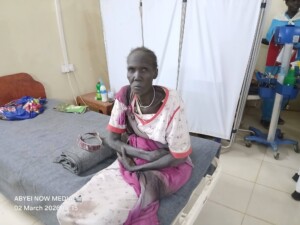Sudan’s liberation movements chart conditions for lasting peace
The Sudan People’s Liberation Movement-North led by Abdelaziz El Hilu (SPLM-N El Hilu), and the mainstream Sudan Liberation Movement under the leadership of Abdelwahid El Nur (SLM-AW), have stipulated that secularism, restructuring of the state and security sector, and pluralism, including recognising the role of women, are essential to lasting peace in Sudan.
 Abdelwahid El Nur (SLM-AW) (r) and Abdelaziz El Hilu (SPLM-N El Hilu) (File photos: RD)
Abdelwahid El Nur (SLM-AW) (r) and Abdelaziz El Hilu (SPLM-N El Hilu) (File photos: RD)
The Sudan People’s Liberation Movement-North led by Abdelaziz El Hilu (SPLM-N El Hilu), and the mainstream Sudan Liberation Movement under the leadership of Abdelwahid El Nur (SLM-AW), have stipulated that secularism, restructuring of the state and security sector, and pluralism, including recognising the role of women, are essential to lasting peace in Sudan.
The two leaders issued a joint statement today at the conclusion of five days of “deep, serious, and transparent dialogue” in the rebel stronghold of Kauda in South Kordofan (Nuba Mountains), to discuss “the long-term historical struggle of the marginalised Sudanese peoples for freedom, justice, equality and human dignity”. The meeting discussed all urgent national issues, issues of transition, and the political current.
Both parties agreed that “the unity of the Sudanese state must be based on: secularism, democracy, liberalism, equal, and decentralised citizenship, balanced development, the free will of its peoples, voluntary unity, and the right of all Sudanese peoples to determine their destiny and their administrative and political future as a human, legal, and genuine democratic right and the principle of the rule of law.”
The parties affirmed their “respect for any means and mechanisms that could lead to a radical solution to the historical Sudanese crisis and the restructuring of the state on new foundations”.
Dialogue
The SPLM-N El Hilu affirmed its understanding and support for the dialogue proposed by the SLM-AW, which affirmed its understanding and support for the Declaration of Principles that was signed between the Sudanese transitional government and (SPLM-N) on March 28, 2021, and its support for the position of the SPLM in the draft agreement framework that it put forward in the negotiations in the Juba platform.
The two movements stress the need to reform the security sector before starting to implement security arrangements. This includes “restructuring all state agencies and institutions and the entire security system (the regular forces) according to new foundations, dissolving all militias, armies, private, partisan and tribal security services, and rebuilding a modern national army with a new military doctrine committed to protecting the citizens and the land of Sudan, the democratic constitution, the law and the rules of the state”.
Land ownership
In their joint statement, the two parties stress the need to recognise the customary ownership of lands and their uses in a manner that achieves justice and to act accordingly, and to acknowledge the ownership of the tribes of their lands with the possibility of the state using the land for the public interest in accordance with fair laws. The two parties also stressed that the comprehensive solution to the Sudanese problem must include land issues in a way that guarantees the return of all the hawakir (compensation) that were extracted during the wars to their original owners.
Voluntary return
The two parties stressed the need to provide security and create an appropriate climate for the voluntary return of displaced persons and refugees and development to meet the needs of areas where genocide, ethnic cleansing, crimes against humanity and war crimes took place, correcting the historical imbalances in development and allocating resources to them, and setting measures for reparation and individual and collective compensation for the displaced, refugees and all those affected, especially Those who were targeted on political and ethnic grounds during the outbreak of wars.
Transitional justice
The two parties affirm the implementation of transitional justice and historical accountability for all those who committed genocide, crimes against humanity, ethnic cleansing, war crimes, rape and material and moral violations against the Sudanese peoples, and handing over all those wanted to the International Criminal Court in The Hague, led by Omar Hassan Ahmed al-Bashir.
Economic sector
Reforming the economic sector, restructuring the Sudanese economy and its institutions, and managing and sharing the national wealth in a fair manner between the regions of Sudan in a way that achieves prosperity, provides job opportunities and encourages productive work, as this is one of the most important requirements for the division of wealth that must be based on the principle of positive discrimination for war zones, development of regions and rationalization of use National wealth and environmental protection, taking into account the entitlements of future generations.
Pluralism
The liberation of the Sudanese peoples from oppression and persecution and the recognition of ethnic, cultural and religious pluralism and bringing it down to reality through institutions, policies and measures that reflect this diversity and show active participation in the formation of the Sudanese identity, and the empowerment of disparate groups in the management of their religious and linguistic affairs and the enjoyment of national identity for the adoption of their own cultures on racial, ethnic, religious, linguistic or regional cultures. The national identity of the state should not be reduced to any of its single components, and it should reflect the country's cultural diversity.
The two parties commend the great role played by youth and women (Kandakas), resistance committees, neighbourhood committees, and all civil society organizations in the glorious December revolution 2018, and their encouragement and support in assuming leadership positions in society and the state.
Strengthening the role of women in all fields and combating harmful customs and traditions that contribute to degrading their dignity and belittling them, enacting laws and legislation criminalizing this, ratifying all agreements related to women’s rights, especially the Convention against All Forms of Discrimination against Women (CEDAW) and working to be All of these agreements are part of Sudanese law and the permanent constitution, the statement concludes.











 and then
and then